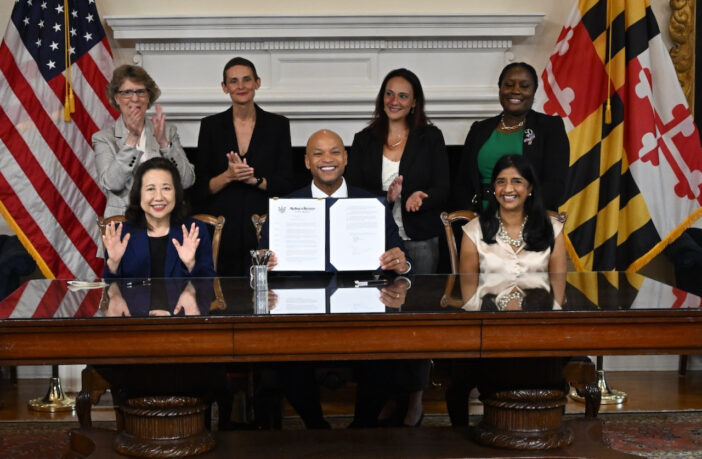Carol Beatty (left), secretary of Maryland Department of Disabilities; Susan C. Lee secretary of state; Katie Olson Savage, secretary of the Maryland Department of Information Technology; Maryland Gov. Wes Moore (D); Rachel London, executive director of the Maryland Developmental Disabilities Council; Lt. Gov. Aruna Miller (D); and Dee Sapp, chair of the Maryland Developmental Disabilities Council pose for a photo after Moore signs a plain language executive order on July 23. (Photo courtesy of the Maryland Office of the Governor)
By Tashi McQueen
AFRO Political Writer
tmcqueen@afro.com
Maryland Gov. Wes Moore (D) signed a plain language executive order on July 23 that aims to make state services and programs more accessible. Moore also recognized 34 years of the Americans with Disabilities Act (ADA).
“If a Maryland family cannot understand updates about a hurricane in their community because our website is hard to read, that’s not good government,” said Moore. “This executive order will help to ensure every piece of writing that comes out of this administration in print and online is simple, accessible, proofread and easy to read. This is not just going to help out some, this is going to help out all.”
The ADA has been in place and protecting people with disabilities from discrimination within the workplace and state and local government programs since 1990.
According to the Pew Research Center, approximately 42.5 million Americans are living with disabilities. Those disabilities include people with vision, walking, cognitive and hearing difficulties.
“Today Governor Moore is taking more action to fulfill the promise he made to all of us when he ran for office, to leave no Marylander behind,” said Rachel London, executive director of the Maryland Developmental Disabilities Council. “With this executive order, he is showing his commitment to make Maryland’s government more accessible and inclusive for all of us.”
London further explained the benefit of ensuring plain language is used in Maryland’s programs and services.
“Plain language is a way of writing so people can understand information the first time they read it,” she said. “When state agencies use plain language in their public documents and on their websites, more people can access the information they need and the information they want. Creation of the Maryland plain language plan will help state agencies take the steps necessary to make sure that happens.”
London touted the strength of the plain language approach, highlighting positive results the Maryland Developmental Disabilities Council has seen through implementing it in Maryland Motor Vehicle Administration (MVA) services.
“The MVA’s Driver’s Manual and learner’s permit test are now in plain language, making it easier for all new drivers to understand the rules of the road,” she said. “We are proud to say that since the plain language tests were rolled out late last year, the MVA has seen a 15 percent increase in people passing the test.”



